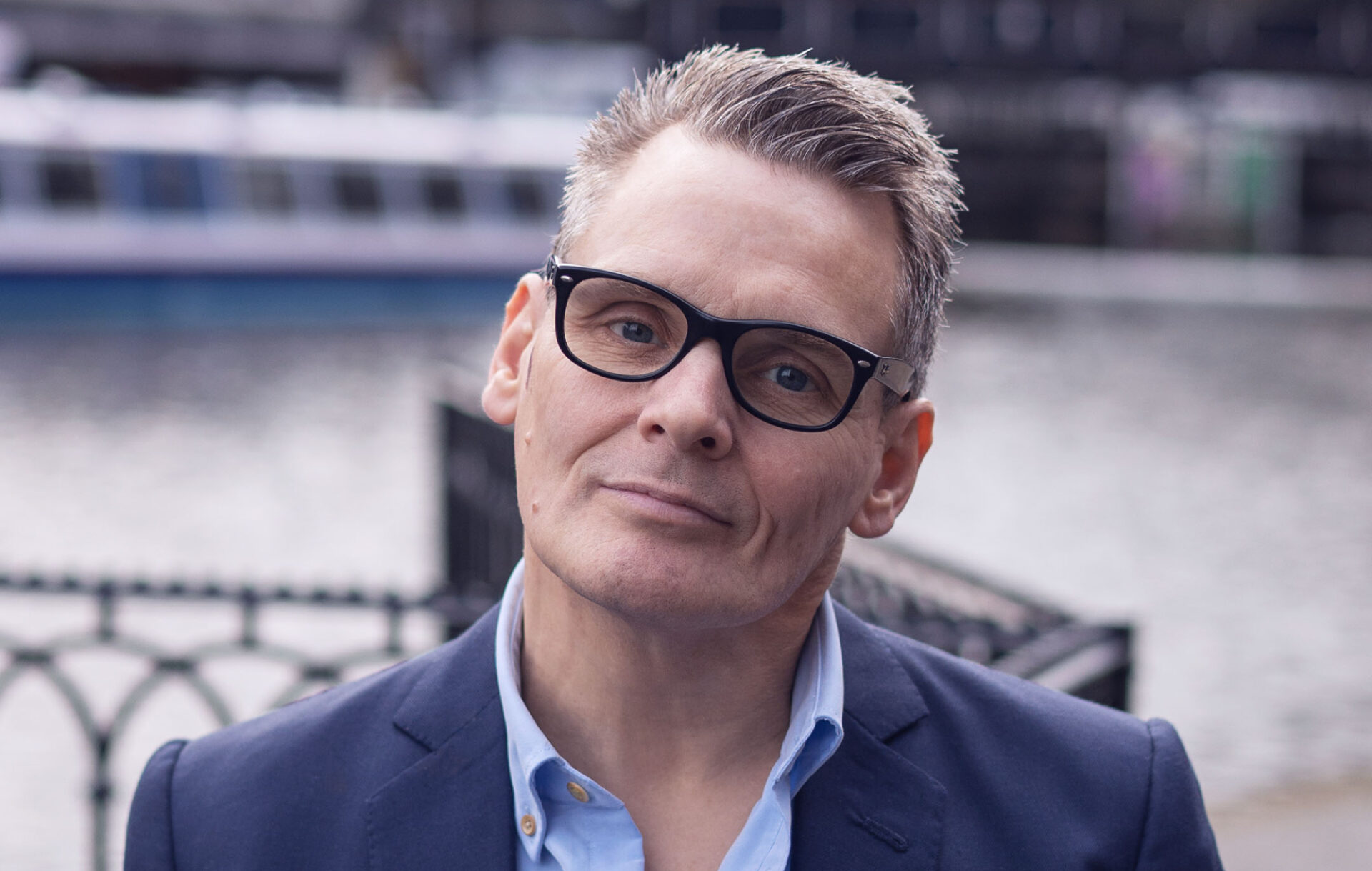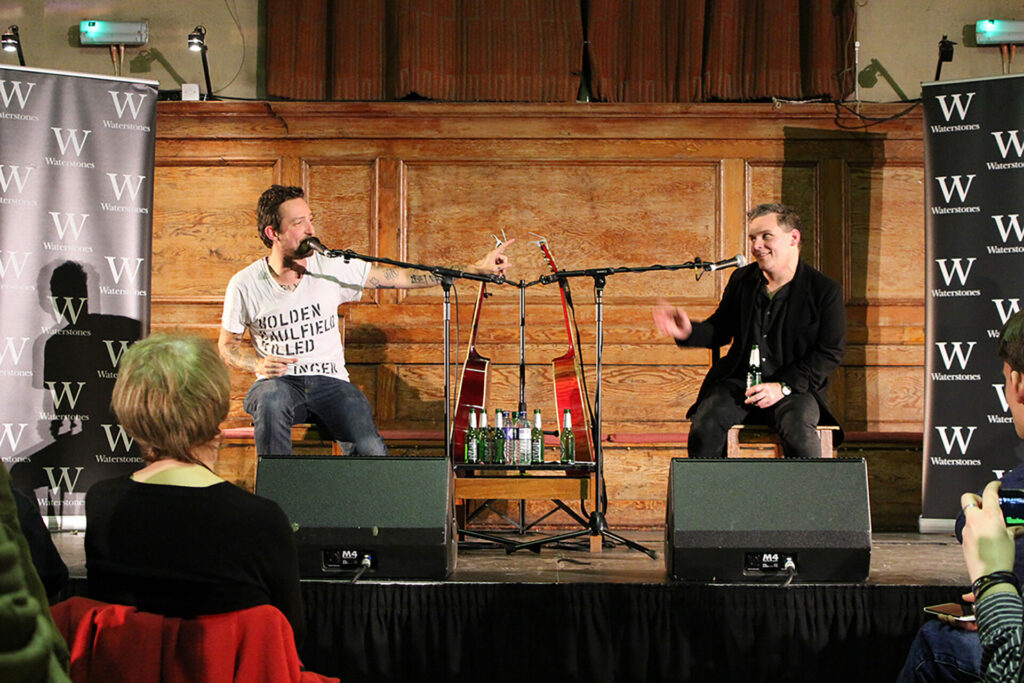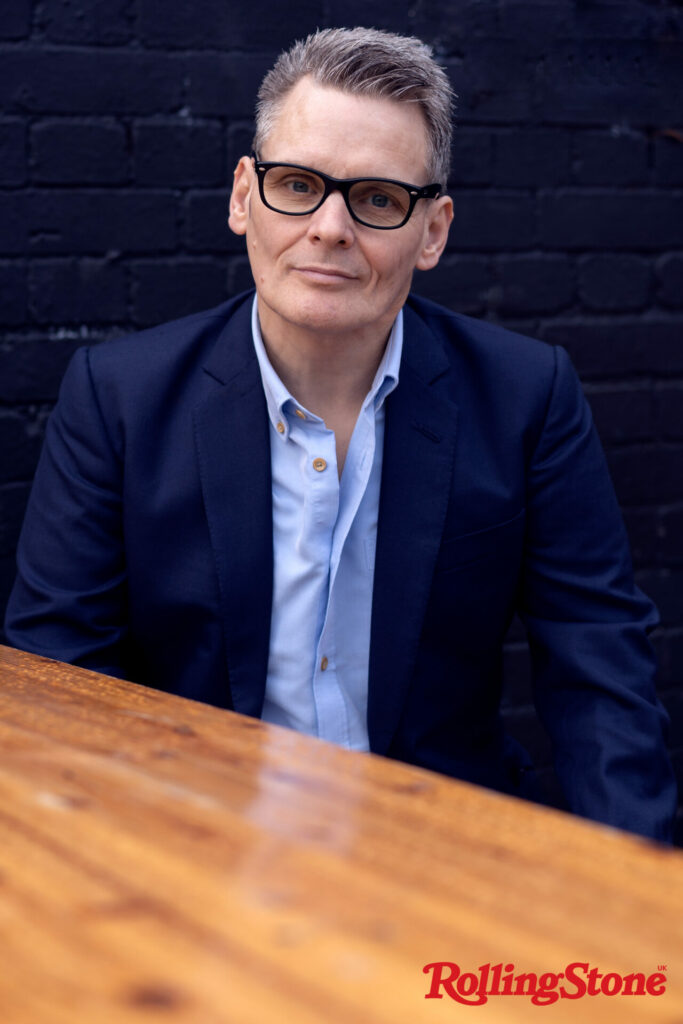Read an exclusive extract from Ian Winwood’s ‘Bodies: Life And Death in Music’
Mental health problems and addiction have afflicted some of music’s best-known names. This is the unpalatable truth as revealed in 'Bodies: Life and Death in Music', written by rock music journalist Ian Winwood. In this exclusive extract, he reveals his private battle with alcohol and drugs
By Ian Winwood

After the death of his father, Ian Winwood found himself mired in a spiral of substance abuse on a life-threatening scale. Benders fuelled by a cocktail of whiskey, cocaine and prescription drugs could last days at a time, only to end with spells in and out of hospital. Here, he describes reaching rock bottom in 2015.
I no longer require space in which to create chaos. An hour before being picked up by my singer-songwriter friend Frank Turner, at the start of a day in early summer, I sink three-quarters of a bottle of whiskey. It would have been more, but that’s all I had. Pushed for time, I drink some of it in the shower. At first convinced that I can hold things together, in the car it transpires that I can barely speak. With London ceding ground to a green and pleasant landscape, Frank and I are on our way to the Latitude Festival in Suffolk, at which I’m due to interview him onstage in front of more than a thousand people.
From Glasgow to Yeovil, over the past few years I’ve been part of maybe a dozen such happenings. In clubs and theatres, Frank draws the applause while I keep things moving. Sometimes I get a laugh or two. At the end of the set he plays a few songs. We have good chemistry, he and I; financially viable, on our second such tour, in 2019, we found ourselves stationed at the kind of hotels that serve eggs royale for breakfast. A writer rarely gets the chance to see an audience: even though it isn’t mine, I’m grateful for having been invited to be part of such a rewarding experience. But for our booking in Suffolk, even the prospect of being paid to talk isn’t enough to stop me. Merely functionally drunk by the time we undertake our mid-afternoon set, in the Big Top tent at Latitude, I can barely hold a thought in my head.
On the long ride home, once again I remind my friend that I’m sorry.
“Honestly, don’t worry about it,” he tells me. “You more or less held it together. Anyway, who am I to talk? I played a gig in Manchester where I was so trashed that the only thing I was able to say was, ‘My name is Frank Turner’. I say ‘say’— I slurred it over and over again. I dropped my plectrum and it took me, like, five minutes to pick it up.”
From this, Frank learned a lesson I seem determined to ignore. After reports of my erratic behaviour during an interview make it back to base camp, the editor of Kerrang! invites me in for a chat.

“Is everything all right?”
“Sorry, I had a bit of a rough spell. I’m out of it now.”
“Okay. All right. But, listen, you can always talk to us, you know.”
Instead, not long afterwards I answer the door to a furious features editor demanding to know the whereabouts of a missing cover story. Despite my insistence that it would be in his inbox five hours ago, by now the article is three days late. “Mate, I swear, it’ll be with you in the morning,” I tell him. Tragically, I actually believe this to be true. A portrait of fury and concern, my visitor is sweeping up the broken glass scattered across the kitchen floor. I’m naked from the waist down. My feet are cut. I can’t say for sure, but it appears that the problem is not simply a matter of poor time management. After being given more than a dozen chances to redeem myself, my editors finally grow tired of cleaning up my mess. For the second time, I allow a dream job to disappear through the many cracks in my world.
“I can blow the doors off in an afternoon”
Along with party packs of bourbon and cocaine, by now I’m taking a vast concoction of very cheap and virulently nasty legal highs sold from a basement shop on the Chalk Farm Road. Wrapped in brightly coloured sachets, each packet carries the warning that this is ‘plant food not meant for human consumption’. I’m swallowing a variety of pills purchased from Dr Internet. Dispatched from India, the tablets are manufactured by a company that requests payment by money transfer from Western Union. GlaxoSmithKline they are not. Warning of the dangers of buying prescription medication online, I well recall seeing an advert at the pictures in which a young man extracts a dead rat from his own mouth. What you order might not be what you get was the gist. But even this grisly public service broadcast isn’t enough to stop me.
With my head wreaking havoc with my circuitry, I think it’s fair to say that my life is in danger. One spring afternoon I wake from a vivid dream in which I’ve been to hospital. Placed on a stretcher by a team of paramedics, beneath sunny skies I’m carried into the back of an ambulance. Needle in hand, a doctor at University College Hospital is required to cut a vertical line up the sleeve of my three-quarter-length navy blue Ben Sherman jacket. Oh, doc, I love this coat. On a gurney in a corridor, I close my eyes with something close to serenity. Coming to at home — well, that was weird — like a doomed character in a horror movie I discover the garment from my ‘dream’ has indeed been cut to the shoulder. I have no idea for how long I was in the care of the National Health Service. I couldn’t tell you what procedures have been undertaken in my name. I don’t recall how I got home. These scrapes of mine are fast becoming unmanageable.
By now I’ve attracted the attentions of a team of care workers, counsellors, therapists and psychoanalysts. On calm days I walk up to a mental health facility in Belsize Park; waiting to be called, I take my place in a waiting room populated by people for whom being terribly unwell is a full-time job. Me, I can cram a month’s worth of damage into two or three days. If required, I can blow the doors off in a single afternoon.
“Ian, what do you think is triggering this behaviour?” I’m asked. “With all due respect,” I say, “the verb is only relevant in the sense that this fucking thing is like a bullet.” I appreciate the talk about trying to slow things down, about learning to spot the signs, but please believe me when I tell you that by now this thing is flying through the air at a velocity that cannot be seen by my naked eye. I think it wants to kill me.
It seems like I’m always in hospital. Driven to the edge of panic by a fellow patient screaming for hours on end, one night I flee from a ward at the Royal Free in Hampstead. Trying his best to stop me, a security guard tells me that the police will pick me up before I reach my front door. Fuck that, I’ll take my chances. Still in my National Health Service pyjamas, clothes clutched to my chest, I board the last Overground train to Camden Road. I’m surprisingly light on my feet, all things considered. Until this morning I’d been under round-the-clock surveillance for three days in case I was killed by the toxins in my system. I couldn’t walk without the assistance of a carer. After knocking back three dozen bottles of spirits and many bindles of cocaine over the course of a nine-day bender, the bill for my actions was steeper than ever.
Gruelling and apparently without end, the requirements of drying out for 72 hours constitute the lowest moments of my life. As if surfing the channels of an upended world, unable to piece together linear thought, my mind leaps erratically across a topography of unconnected moments.
Scrunched under a thin blanket that somehow fails to cover even my own limited form, under these conditions I’m easy prey to the worst kind of desolation I’ve ever known. Panic is only ever a breath away. From a hospital bed at four o’ clock in the morning, my situation seems hopeless. I just can’t see a way out of this.
And then I go home.

The police never came. Amid the glow of an equally disproportionate belief that everything has returned to normal, over the course of a few days I walk half a mile to the crisis team at St Pancras Hospital. Abutting the coroner’s complex at which I visited my father, the people treated here are on the cusp of presenting a clear and present danger to themselves and to others. One step further and we’re in the realm of ‘involuntary commitment’. A section order; detention without trial. By now I’m no longer in anything like the state I was just three or four days earlier. Retelling my tale, not for the first time I’m told that my case is most unusual. “I know,” I say. “I wish it weren’t.”
“So how do you feel today?”
“Honestly? I feel all right. I really do.”
After four or five visits, I’m told that I no longer fit the criteria required to access the services of the crisis team. Not that it matters. I always come back for more.
One visit to the Royal Free lasts for a fortnight. A two-week holiday in a sixth-floor ward from which I am permitted no chance of escape, this time my circumstances are even more embarrassing than usual. With the Beast from the East blowing its hateful breath down from Haverstock Hill, every afternoon I receive a ward call from a kindly intermediary charged with escorting me over the bridge that spans the departments of physical and mental health. Each day my young visitor tells me that as yet he’s been unable to secure lodgings at a halfway house in which I will stay for seven or ten nights before once more returning home. Up and across Camden and Islington, brand-new patients are throwing themselves at police stations and hospitals; in states of mania, their need is greater than mine.
“Don’t worry,” I say. “I understand.” One of my many problems is the timelag between my actions and their required response. As soon as I’m in the care of the professionals, I’m putting myself back together. We need to synchronise our watches, the system and me.
“One visit to the Royal Free lasts for a fortnight. A two-week holiday in a sixth-floor ward from which I am permitted no chance of escape”
Up at the Royal Free, I’m surprised at just how quickly I acclimatise to days in which I do almost nothing. Curled up in bed, I watch the hockey from the Winter Olympics; after that, it’s time for repeats of Minder and The Sweeney. With a longing that suggests I’m about to depart for a trip to paradise, I await the arrival of the meals ordered each morning from a sheet of photocopied paper. Chilli con carne, chicken korma, tapioca, rice pudding. Emerging from a bewildering haze of transcontinental chatter, shortly after breakfast I’m visited by the ward sister. With kind but tired patience, she tells me that, fingers crossed, this might just be the day that I’m shipped out to the halfway house. There is a name for people like me. I am a bed-blocker. Responding with muted embarrassment, by now it’s obvious that there is no longer anything immediately wrong with me. After 14 barren nights, I’m dispatched home.
“Ian, mate, what the fuck is going on?”
People are genuinely trying to help. Pulled taut like zip-wire, the component parts of the system do their best to prevent me from crashing to the floor. But, really, I’m the problem. I can’t be stopped and I can’t be controlled.
After I fail to appear for a gig at the Royal Albert Hall, my friend Dan bangs on the front door for 15 minutes. Just sit tight, he’ll go away. “I’m not going away,” he shouts through the letter box. “Ian, mate, what the fuck is going on?”
Shaking and grey, once more I’m in an ambulance en route to hospital — this time UCL on the Euston Road. Arms outstretched, with passionate reasoning I’d tried my best to convince the medics that all was peachy.
But with the flat looking as if it’d been upended by a poltergeist, they were having none of it. I’m told that if I don’t go voluntarily I will be removed from my home by force. By now, I’m boring even myself. Certainly I’m beaten down. The thing about all this is, it’s exhausting.
At University College Hospital I’m visited by a psychiatrist. Exhaling through his nose, the man by my side disagrees with my assessment that I should be sent home to begin yet another streak of unremarkable days. As permeable as Sheffield steel, he tells me that this week’s misadventure is sufficiently serious as to require the direct intervention of the state. In his hands is a clipboard on which are written my by now impressive array of diagnoses. Once again, let’s have a big hand for Post Traumatic Stress Disorder, Rapid Cycling Bipolar Affective Disorder, Borderline Personality Disorder, Emotional Dysregulation Disorder and Impulse Control Disorder. Chaos. I think it’s fair to say that some of these conditions are educated guesses made by an ever-increasing number of experts. Some are majority decisions.
Today I find it unhelpful to spend too much time wondering how many of these assignations actually apply to me. But then, something’s clearly wrong. The liquids and powders with which I am poisoning myself to death are merely symptomatic.
Knowing this, the man by my bedside offers me a choice. Either I agree to a transfer to a psychiatric care institution, or else he’ll seek a second opinion from one of his colleagues and I’ll be going there anyway under a section order. Considering my options, suddenly I feel like Captain Yossarian in Catch-22.
“That’s some catch, that Catch-22,” I’ll tell him, to which the shrink will reply, “It’s the best there is.”
Instead, I say, “I mean, that’s some pretty slim pickings.”
“I’m afraid so.”
A moment’s silence. An express train from denial to acceptance.
“This isn’t a negotiation, is it?”
“I’m afraid not.”
Extract from Bodies: Life and Death in Music, published by Faber on 21 April.
